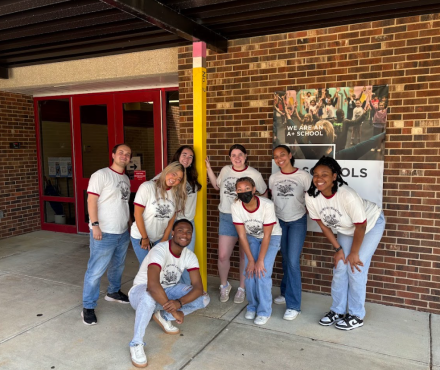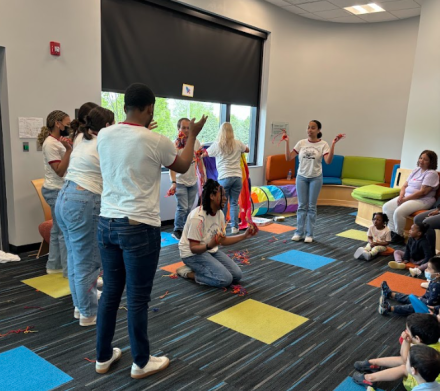Elon Department of Performing Arts students were able to use their art to build relationships in the community with a new course: Arts Education in Action.
In Spring 2024, Associate Professor of Theatre Kim Shively launched the community-based learning course “Arts Education in Action.” The new course was in partnership with the Kernodle Center for Civic Life and funded by a Community Partners Initiative (CPI) Grant.

Eight students from the drama theatre studies, acting and music theatre programs in the Department of Performing Arts participated in the course, which offered high-impact experiences for the student artist-educators. Students engaged with anti-oppressive pedagogies, including the best practices of boundaries and consent for creative spaces when working with minors. They then put their theory into practice, working with elementary students, performing in a mini tour with local area libraries and creating curricula for a local non-profit community theatre.
Shively participated in the Community-Based Learning Scholar and Fellows program as she developed the course. Along with Nermin Vehabovich, assistant professor in the Jo Watts School of Education, Shively used the Community-based Fellows program to build a course that would impact young people in the community by building relationships with emerging arts educators.
Building Relationships
The inspiration for this course came from a desire to reach beyond the Center for the Arts walls and create relationships with the community.
“Theatre is an exceptional catalyst to bring out the best in our humanity; belonging, connection and critical thinking all happen when we get people together with a common purpose for the arts,” said Shively, whose background includes working as an arts educator.
Aware that many students and alumni were working as arts educators, Shively wanted to help these students gain a head start on learning the foundational practices and pedagogies that would benefit students most.
Students spent six weeks working with after school students at North Graham Elementary, as they learned to develop and implement lesson plans and make necessary adjustments in response to student feedback.
“The course taught me to channel my love for performing into another meaningful avenue by fostering the imagination of young students,” said Monique Fogg ’24, who graduated with a bachelor of fine arts in acting. “By working with elementary school students, I was able to develop skills such as time management, lesson planning and leadership.”
The Arts Education in Action cohort also enjoyed building meaningful relationships with students over the course of their visits.
Students on Tour
A highlight of the class was the library mini tour. The students devised a performance using the poems of Shel Silverstein that they shared as a part of programming for Poetry Month. They then took their show on the road to local libraries. This was one of Fogg’s favorite parts of the class.

“I really enjoyed devising the Shel Silverstein poems performance with the rest of the ensemble,” said Fogg. “We worked together and created something so fun for the kids and were able to go to their local libraries and possibly be their first introduction to theatre. It was an extremely rewarding and gratifying experience.”
Finally, the class connected with local community theatre Studio 1’s Artistic Director Tami Kress. Students interviewed Kress and then built class curricula in their specific area of interest based on the needs presented by Kress. For their final project, the students presented their proposals to Kress.
“Being able to give the students a culminating experience like building curriculum from scratch was an important exercise,” said Shively. “They could see how much they had learned and integrated into their practice over the semester. They left the course ready to engage with this work, and with an understanding of what kind of work they enjoy most, and what next steps they need for their ongoing training.”


